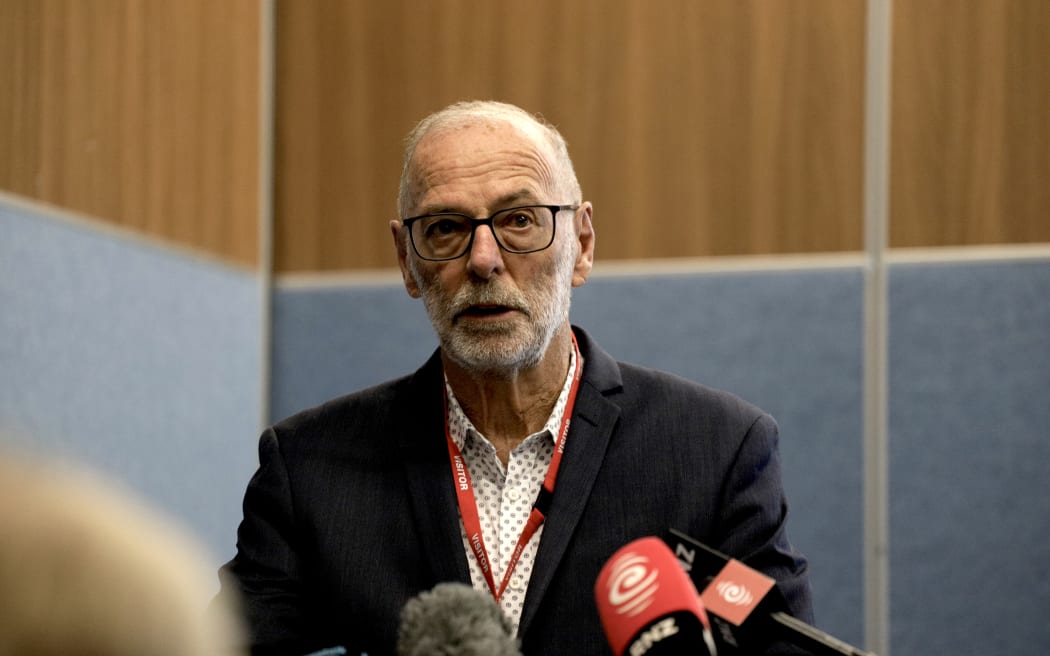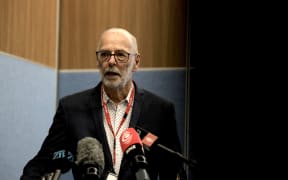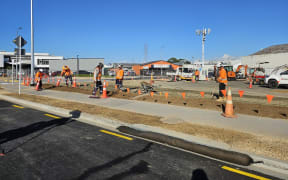
Auckland mayor Wayne Brown speaks about his proposals for the city's budget. Photo: RNZ / Marika Khabazi
Auckland Mayor Wayne Brown's bluff has been called - he had no authority to tell Auckland Transport to immediately stop work on projects funded by the soon-to-be scrapped regional fuel tax (RFT).
Emails provided under the Local Government Official Information Act show within minutes of the mayor making his formal request public, a councillor questioned if he held such power - and the answer was no.
It came amidst a tense public exchange between the mayor and Transport Minister Simeon Brown, over funding the city's infrastructure.
The regional fuel tax will be gone by July, leaving a question mark hanging over most of the 14 transport projects it helps pay for in Auckland.
Mayor Brown was quick to respond to the government's announcement last month confirming the tax would go - the council issuing a media statement headlined "Mayor tells AT to stop work on RFT funded projects".
But construction has not stopped on projects already under way - despite the mayor's edict - with emails provided under the Official Information Act showing Wayne Brown can not direct Auckland Transport to start or stop any activity.
Public transport advocate Matt Lowrie said it was like a game of poker.
"That's his bluff being called right and he's not going to be able to do that too often. It's him highlighting that there is a disparity there, that the government is just unilaterally making decisions as to what Auckland funds."
But he said if the stop-work request was seen as a political statement, it made sense.
"It's always just been that the political brinkmanship that's been going on to create some tension between the government and the council. The mayor has been quite clear throughout his tenure that he wants more decision making in Auckland and I feel that was just part of that."
Shortly after the mayor issued a media release, long-standing councillor Chris Darby asked the chief executive to "outline what authority the mayor has to arbitrarily instruct AT to stop work on RFT funded projects?".
In an email replying to Darby's question, Auckland Council chief executive Phil Wilson said the mayor did not have that power.
"The straightforward answer is no, the mayor does not have power to unilaterally direct AT or other CCOs to start or stop any activity. That is the prerogative of the Governing Body or its committees through normal democratic process."
He wrote that the mayor did have a legitimate - and statutory - role to lead all policy and budget matters and to communicate with Aucklanders.
"I appreciate the language was framed as a black and white directive, but if you take the statements more as indicating his preferred direction or arising from his inarguable political and civic leadership role, there is something of a defence in that."
Wilson also said "the most fruitful way of dealing with an issue like this with Mayor Wayne, is to have a direct chat".
But Brown declined an interview with RNZ, with a spokesperson from his office saying there was "no story" and he was "within his rights to request they stop working on those projects".
The February release stated that Mayor Brown requested that Auckland Transport pause work on projects that were earmarked to be partially RFT-funded "where construction contracts have not been executed, including consultant or contractor spend".
Auckland Transport also declined an interview.
Councillor Chris Darby also declined to be interviewed.
Looking ahead, Lowrie said it would be important to understand what projects will go ahead, outside the Eastern Busway, City Rail Link and some roading improvements which were prescribed in legislation.
"These decisions and the cut of the regional fuel tax makes a significant impact on Aucklanders' ability to get around in the future."
Auckland Transport is reviewing its entire list of projects, to decide what should get the limited funding is has available - and what is stopped, deferred or shrunk.
This will be reported back to council for its decision-making on the Long Term Plan, which sets the budget for the next 10 years and is open for feedback until the end of this month.






